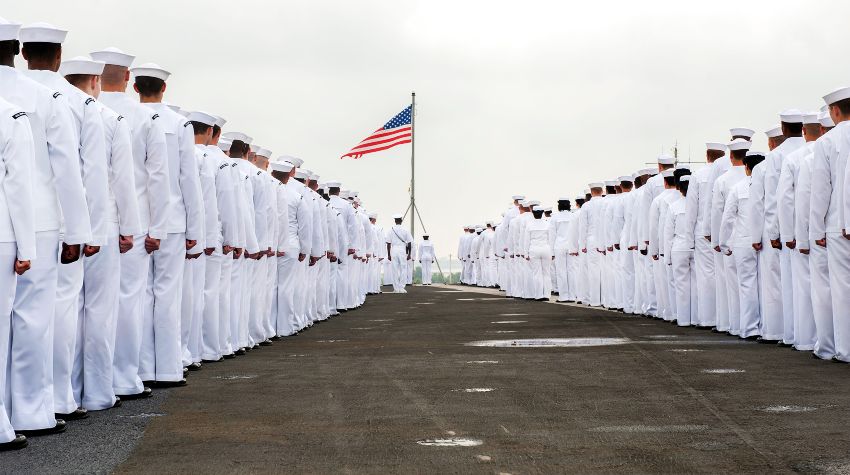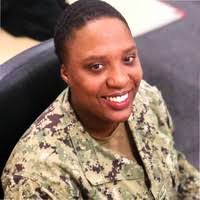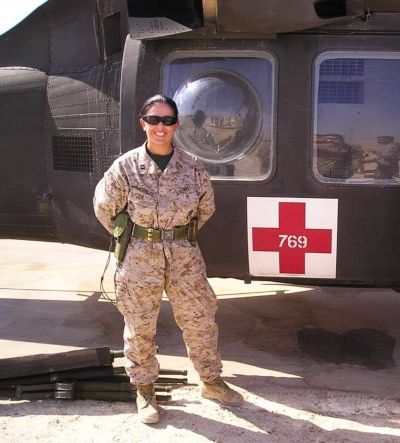By Felicia Campbell
[4 minute read]

After serving in the Navy for six and a half years as a Hospital Corpsman Third Class, Victoria "Vic" Faulkner transitioned into a career at UC San Diego Extension that isn't so different.
 "When I was in the Navy, I used to tell people I saved people's lives, which is true, especially when I worked on the inpatient ward or when I was overseas," she says. "Now I tell people I work at UCSD essentially doing the same thing I did in the Navy. But without the Hospital Corpsman Third Class part. And without the saving lives part. And without the Navy part."
"When I was in the Navy, I used to tell people I saved people's lives, which is true, especially when I worked on the inpatient ward or when I was overseas," she says. "Now I tell people I work at UCSD essentially doing the same thing I did in the Navy. But without the Hospital Corpsman Third Class part. And without the saving lives part. And without the Navy part."
Faulkner (pictured, left) works in operations support for the Arts & Languages and Healthcare Education departments at UCSD Extension. And she's known as a bit of a jokester. Still, she says the skills she gained in the Navy proved invaluable to her civilian career.
"Attention to detail was hammered into our heads from day one in boot camp. You would be surprised at how the majority of society doesn't read or follow directions or pay attention to the same details," Faulkner explains. "Actually, I didn't think I would need that skill outside the Navy, but it's a skill that I'm grateful I learned and continue to apply in my professional life."
Celerina Cornett (pictured, below right), the Director of Healthcare Education at UC San Diego Extension, served in the U.S. Navy for 24 years, first as a Hospital Corpsman and then as a Naval Officer in the Medical Service Corps. Despite decades of experience, Cornett was eager to continue her education when she retired.
 "I wasted no time in returning to school to earn my second master's degree from UCSD," she said. After earning a Masters of Advanced Studies in Leadership of Healthcare Organizations, she became Director for UC San Diego Extension's Healthcare Education and Behavioral Sciences.
"I wasted no time in returning to school to earn my second master's degree from UCSD," she said. After earning a Masters of Advanced Studies in Leadership of Healthcare Organizations, she became Director for UC San Diego Extension's Healthcare Education and Behavioral Sciences.
"I love my job because I'm able to continue serving people. I strive to provide high-quality education to my students that will have a positive impact on their career goals," Cornett said.
She noted that she will always be passionate about helping fellow veterans make their transition. Professional certificate programs, she said, are a great way for veterans to parlay their military training and skills into vibrant civilian careers.
"Transitioning military members have an exceptional amount of leadership experience," Cornett explained. With the addition of a certificate in a leading field, she said it's a great combination in the current job market.
Though a Hospital Corpsman Third Class is perfectly poised to become an RN or Doctor, as Vic Faulkner demonstrated, new civilian careers don't need to be literal translations of a veteran's military classification.
"I like the behind the scenes and independent aspect of my job," Faulkner said. "I am just as helpful and present as I was in the healthcare environment but, I do it all from my computer or desk. Also, I've found that I enjoy working with numbers and computers."
She added that "The personalities within my departments are amazing, and I'm grateful I was able to be placed here." Like many veterans, Faulkner was surprised by the personal challenges of transitioning from military to civilian life.
"Even if you had a life before the military, a job, some college when you receive your DD214 after two tours, it feels like entering the world for the first time," she explained. "The biggest challenge isn't making sure all your benefits are aligned or managing to write down and remember EVERYTHING they tell you in all the transition classes. It's not leaving the friends, the places, and the opportunities the Navy has afforded you. The most challenging part is no matter where you go or who you talk to, is that no one will understand what it's like transitioning from the military unless you're talking to another vet."
Her advice? "Take your time and be patient with yourself. It's not the plan that fails; most people just fail to plan."
Cornett echoed Faulkner's sentiment. "My personal advice is to first take a pause for reflection, then decide on a handful possible career fields that interest you and start learning everything you can about your next possible career role," she said. "I returned to college to not only sharpen the saw with my knowledge but also to help me adjust to the civilian lifestyle and people. Working on college projects with my classmates allowed me to network with civilians in the workforce."
Find your next mission with a UC San Diego Extension professional certificate program. Read more about six great careers for translating military skills into civilian success.